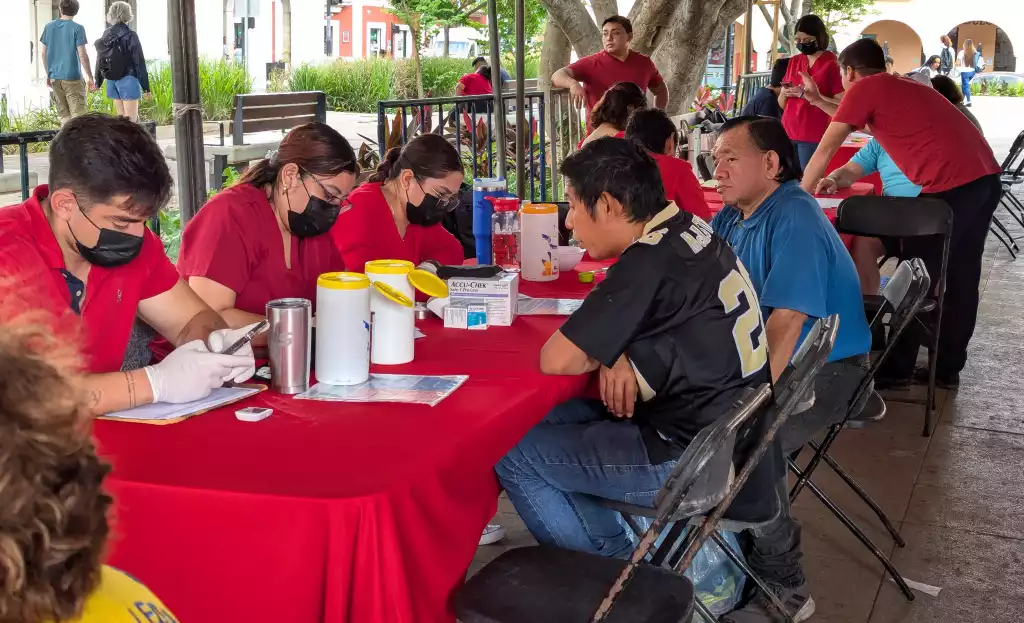Mérida, Yucatán — The S3D collective has raised alarms about a potential increase in mother-to-child HIV transmission cases in Yucatán. Their representative, Gerardo Cabrera, called on state authorities to strengthen coordination with civil organizations, expand treatment coverage, and ensure sufficient resources to face 2025 without setbacks.
During a meeting with the press, Cabrera explained that at the Centro Ambulatorio para la Prevención y Atención en SIDA e Infecciones de Transmisión Sexual (Capasits) in Mérida, nine HIV diagnoses have been detected in girls and boys under six years old so far this year, a figure that, he said, cannot go unnoticed.
For the activist, this number demands a serious investigation to explain why cases are appearing at such early ages.
He also criticized that, although there are studies and official reports on HIV behavior in the state, they do not always translate into specific measures. “We already know that infections are appearing in younger people. The point is: what are we doing with that information? It’s not enough to record it, we must act,” he stated.
Cabrera insisted that civil organizations handle firsthand information and know about situations that often do not appear in institutional diagnoses. Therefore, he called on the state government to integrate them into decision-making, not just as observers but as allies.
Pending Issues to Address
The S3D representative also listed a series of pending issues that require urgent attention: the lack of comprehensive sexual education programs for adolescents born with HIV; the emotional exhaustion of young people who have taken antiretrovirals their entire lives; the situation of AIDS survivors, who face side effects and signs of premature aging; and the shortage of geriatric specialists to care for adults who have lived with HIV for more than a decade.
Regarding access to medications, he recalled that the law guarantees treatment once diagnosis is confirmed, but acknowledged that there are still problems with coverage due to insufficient budgets and lack of foresight for new cases. “Everyone has access, because that’s what the law states. But that doesn’t mean it always suffices. There are failures in planning and in how treatments are scheduled,” he noted.
Cabrera emphasized that the federal budget approved for 2025 includes cuts in campaigns and related areas, so he asked the state government to assume part of the effort. “Yucatán can and must allocate its own resources for HIV. We cannot depend only on federal money. We need it, those of us who live and work in this state,” he affirmed.
The organizations that accompanied him agreed that the issue must be integrated into the fiscal package to be presented in December, with clear and earmarked resources. They assured that guaranteeing a local budget is key to strengthening prevention, treatment, and support for people living with HIV in Yucatán.
Activities Schedule
Parallel to these demands, collectives and civil associations will begin tomorrow the activities of the World AIDS Day campaigns, an effort that for over four decades has sought to make this condition visible, dismantle prejudices, and support those living with HIV. Discussion panels, artistic exhibits, reflection activities, and a silent walk are part of the program.
The campaign, titled “From Silence to Pride: Four Decades of Fight Against HIV and AIDS,” aims to rescue memory and renew social commitment in a scenario that, according to Cabrera, shows signs of lag. “There should not be a single more case of HIV transmission. No one should die from advanced disease. And most painfully: no more children should be born with HIV,” he expressed.
The activities will start today with two events. The first will be a discussion panel at the Centro Peninsular en Humanidades y Ciencias Sociales (Cephcis) of UNAM, where the Secretariat of Youth and the S3D collective will open a space for people with HIV to share their experiences, difficulties, and support networks.
Later, an exhibition of posters presenting a historical journey through prevention campaigns over the years will be inaugurated. According to Geovanna Cárdenas, program coordinator of the BAI Foundation, the exhibit aims to recover memory about how this fight has been told, understood, and supported through time.
The central event will be the Silent Night Walk, scheduled for December 6 at 18:00 hours in the Historic Center of Mérida. The mobilization seeks to honor the memory of those who died from HIV, support those living with the virus, and remind that the fight continues. The invitation is open to people with HIV, families, friends, and the general public.
Discover more from Riviera Maya News & Events
Subscribe to get the latest posts sent to your email.
